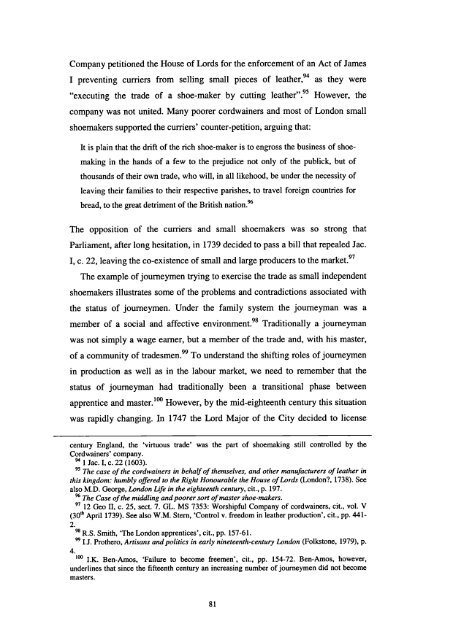The Boot and Shoe Trades in London and Paris in the Long Eighteenth Century
The Boot and Shoe Trades in London and Paris in the Long Eighteenth Century
The Boot and Shoe Trades in London and Paris in the Long Eighteenth Century
You also want an ePaper? Increase the reach of your titles
YUMPU automatically turns print PDFs into web optimized ePapers that Google loves.
Company petitioned <strong>the</strong> House of Lords for <strong>the</strong> enforcement of an Act of James<br />
I prevent<strong>in</strong>g curriers from sell<strong>in</strong>g small pieces of lea<strong>the</strong>r, 94 as <strong>the</strong>y were<br />
"execut<strong>in</strong>g <strong>the</strong> trade of a shoe-maker by cutt<strong>in</strong>g lea<strong>the</strong>r". 95 However, <strong>the</strong><br />
company was not united. Many poorer cordwa<strong>in</strong>ers <strong>and</strong> most of <strong>London</strong> small<br />
shoemakers supported <strong>the</strong> curriers' counter-petition, argu<strong>in</strong>g that:<br />
It is pla<strong>in</strong> that <strong>the</strong> drift of <strong>the</strong> rich shoe-maker is to engross <strong>the</strong> bus<strong>in</strong>ess of shoe-<br />
mak<strong>in</strong>g <strong>in</strong> <strong>the</strong> h<strong>and</strong>s of a few to <strong>the</strong> prejudice not only of <strong>the</strong> publick, but of<br />
thous<strong>and</strong>s of <strong>the</strong>ir own trade, who will, <strong>in</strong> all likehood, be under <strong>the</strong> necessity of<br />
leav<strong>in</strong>g <strong>the</strong>ir families to <strong>the</strong>ir respective parishes, to travel foreign countries for<br />
bread, to <strong>the</strong> great detriment of <strong>the</strong> British nation?<br />
<strong>The</strong> opposition of <strong>the</strong> curriers <strong>and</strong> small shoemakers was so strong that<br />
Parliament, after long hesitation, <strong>in</strong> 1739 decided to pass a bill that repealed Jac.<br />
I, c. 22, leav<strong>in</strong>g <strong>the</strong> co-existence of small <strong>and</strong> large producers to <strong>the</strong> market.97<br />
<strong>The</strong> example of journeymen try<strong>in</strong>g to exercise <strong>the</strong> trade as small <strong>in</strong>dependent<br />
shoemakers illustrates some of <strong>the</strong> problems <strong>and</strong> contradictions associated with<br />
<strong>the</strong> status of journeymen. Under <strong>the</strong> family system <strong>the</strong> journeyman was a<br />
member of a social <strong>and</strong> affective environment. 98 Traditionally a journeyman<br />
was not simply a wage earner, but a member of <strong>the</strong> trade <strong>and</strong>, with his master,<br />
of a community of tradesmen. 99 To underst<strong>and</strong> <strong>the</strong> shift<strong>in</strong>g roles of journeymen<br />
<strong>in</strong> production as well as <strong>in</strong> <strong>the</strong> labour market, we need to remember that <strong>the</strong><br />
status of journeyman had traditionally been a transitional phase between<br />
apprentice <strong>and</strong> master.'°° However, by <strong>the</strong> mid-eighteenth century this situation<br />
was rapidly chang<strong>in</strong>g. In 1747 <strong>the</strong> Lord Major of <strong>the</strong> City decided to license<br />
century Engl<strong>and</strong>, <strong>the</strong> 'virtuous trade' was <strong>the</strong> part of shoemak<strong>in</strong>g still controlled by <strong>the</strong><br />
Cordwa<strong>in</strong>ers' company.<br />
1 Jac. I, c. 22 (1603).<br />
<strong>The</strong> case of <strong>the</strong> cordwa<strong>in</strong>ers <strong>in</strong> behalf of <strong>the</strong>mselves, <strong>and</strong> o<strong>the</strong>r manufacturers of lea<strong>the</strong>r <strong>in</strong><br />
this k<strong>in</strong>gdom: humbly offered to <strong>the</strong> Right Honourable <strong>the</strong> House of Lords (<strong>London</strong>?, 1738). See<br />
also M.D. George, <strong>London</strong> Life <strong>in</strong> <strong>the</strong> eighteenth century, cit., p. 197.<br />
<strong>The</strong> Case of <strong>the</strong> middl<strong>in</strong>g <strong>and</strong> poorer sort of master shoe-makers.<br />
12 Geo II, c. 25, sect. 7. GL. MS 7353: Worshipful Company of cordwa<strong>in</strong>ers, cit., vol. V<br />
(3Øth April 1739). See also W.M. Stern, 'Control v. freedom <strong>in</strong> lea<strong>the</strong>r production', cit., pp. 441-<br />
2.<br />
R.S. Smith, '<strong>The</strong> <strong>London</strong> apprentices', cit., pp. 157-61.<br />
I.J. Pro<strong>the</strong>ro, Artisans <strong>and</strong> politics <strong>in</strong> early n<strong>in</strong>eteenth-century <strong>London</strong> (Folkstone, 1979), p.<br />
4.<br />
100<br />
1K. Ben-Amos, 'Failure to become freemen', cit., pp. 154-72. Ben-Amos, however,<br />
underl<strong>in</strong>es that s<strong>in</strong>ce <strong>the</strong> fifteenth century an <strong>in</strong>creas<strong>in</strong>g number of journeymen did not become<br />
masters.<br />
81


